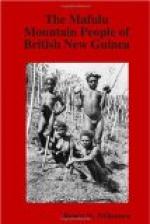If the belief arises that the calamity, especially that of death, has been brought about by spiritualistic influence, the family will probably go to some person who is believed to be in touch with spirits and able to designate the culprit. I cannot say whether or not the person so employed is regarded as being a sorcerer in the full sense of the word, or as merely one of the inferior types of magic men above referred to. Probably he is only the latter, as I do not think there are any juvenile sorcerers among the Mafulu, and this particular person may be quite a young boy; indeed, there is in a village near to the Mafulu Mission Station a young boy who is supposed to have this power. As a matter of fact this boy is not quite right in his head; but this state of mind is not among the Mafulu in any way a necessary, or indeed a usual, qualification for a sorcerer or magic man of any sort. The person appealed to will perhaps tell them who has done the deed, or will make some oracular statement which will lead to his identification. The culprit identified by him will in any case be a member of another clan, and most probably of another community. When he has been discovered, there will probably be a fight, in which the members of the victim’s clan, or even, especially if the victim be a chief or big person, the whole of his community, will join the injured relatives, this question of suspected causing of death being, like that of non-repayment of the price paid for a runaway wife, one of the frequent causes of intercommunity fighting.
Reverting here to the matter of ghosts and spirits, one cannot help noting a similarity between, on the one hand, the ghostly element of living food plants and the ghostly element of human excrement, which constitute the food of the ghosts, and, on the other hand, the physical inedible remnants of food recently eaten by an adult victim and the physical excrement and urine of an infant victim, which are the media used for hostile sorcery through the power of spirits; though, as regards the latter, I have no evidence of a belief that the spirits eat them. I tried to get further into this matter, but was unable to do so. Again one is struck by the fact that the special gabi tree, which is the tree used for the interment of chiefs and notables, is one of the trees whose presence is regarded as indicating a place inhabited by spirits. These elements of similarity tend, I think, to suggest the possibility of some confusion in the native mind as to the difference between ghosts and spirits, or of some originally ghostly origin in what are now regarded as spirits.
The class of magic men who are something less than sorcerers, and whose powers are perhaps confined to the knowledge of certain specific forms of incantation, would probably include the person who does the nose-boring, and perhaps the person who detects the causes of death above referred to. It would also, I think, include the men who ascertain the whereabouts of a stolen article and discover the thief, and who perform the ceremony in connection with hunting, and the persons who effect, or profess to effect, cures of a more or less superstitious nature, all of whom are probably not regarded as full sorcerers.




